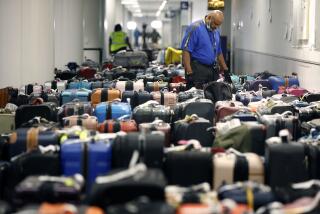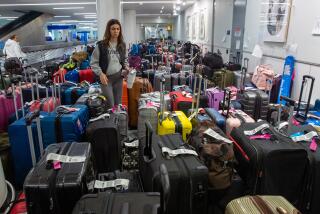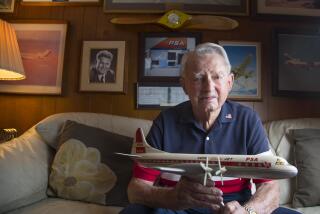Arthur F. Kelly, 88; Innovative Chief of Western Airlines
- Share via
Arthur F. Kelly, a former head of Western Airlines who prided himself on his planes’ on-time arrivals and departures, lured customers with free champagne and more leg room and coined such marketing slogans as “Western Airlines, the oooonly way to fly,” has died. He was 88.
Kelly died Nov. 20 in Gig Harbor, Wash., of complications from old age, said his son, Arthur F. “Chip” Kelly II. Formerly of Los Angeles, the elder Kelly recently moved to Washington to be near his family.
He spent nearly half a century with Western before it merged with Delta in 1986. After a beginner’s job with United Airlines sweeping out planes in San Francisco, he joined Western in 1937 as manager of a “one-man airport” in Butte, Mont. He sold the tickets, peddled the box lunches, shoveled the snow and loaded the passengers and their luggage.
Serving as an Army colonel in the Air Transport Command during World War II, Kelly gained more managerial experience by marshaling the travel of 1,000 aircraft and 30,000 men in England, France and Germany.
He returned to Western after the war, moved up to vice president in 1949, was elected a director in 1968, and became president and chief executive officer in 1973 when financier Kirk Kerkorian owned controlling interest in the airline.
In 1976, Kelly shed the president’s title and became chairman of the board and chief executive, and in 1979 exchanged those duties for the post of chairman of the executive committee.
During his years in top management, he weathered the failure of two attempted mergers: one with American and another with Continental. After Western merged with Delta, he retired as chairman emeritus.
Kelly, a rarity in the industry because he rose through the marketing side of the business, was always a salesman at heart.
Convinced that late planes turned away customers, he reviewed each day’s on-time performance, examined the reasons behind any delays and took steps to prevent recurrences. Not by accident did Western top all airlines for the best on-time performance for four years running on Kelly’s watch.
As Western’s profits grew, the president outlined for The Times his top three marketing ploys: demonstrating on-time operation, providing “first class leg space in coach” and offering free champagne to all passengers on all flights.
As deregulation evolved, Kelly was bold and innovative in offering “no-strings” reductions that benefited the lucrative business market as well as tourists.
If customers were unhappy with Western’s service, the boss wanted to know about it. He took all calls, even at home on weekends or in the middle of the night, and spent two hours a day answering the 200 to 300 letters he received each week.
“Ours is a service business,” he told The Times in 1975. “My feeling is that if I can’t take time to listen to what the public is saying, I’d better get out and find something else to do.”
Describing himself as “sort of a human clock,” Kelly did find reason to enjoy one flight delayed by a blizzard.
He introduced himself to the passengers and spent four hours talking to one pretty young woman: character actress Sally Payne. They eventually married and spent 55 years together before her death two years ago in their Bel-Air home.
Also a board member of Hollywood Park, Kelly, who minored in geology at the University of Utah, successfully proposed drilling for oil on the racetrack grounds to increase revenues. Slant drilling under the parking lot produced the well “Pick Six No. 1,” named for the track’s Pick Six betting sweepstakes in which bettors choose winners in six consecutive races.
“There are two things I always wanted to do in my fantasies,” Kelly told Forbes in 1982 after his idea paid off: “find a gold mine and discover oil.”
Kelly also served on the boards of Santa Clara University, Alaska Pacific University, UCLA Chancellor’s Advisors, the Arthritis Foundation, the National Space Assn., the National Aeronautical Assn., the Los Angeles, California and U.S. Chambers of Commerce, the Air Transport Assn. and the Conquistadores del Cielo.
He also directed the restoration of a two-seat Douglas M-6 aircraft now in the Smithsonian Institution in Washington, as an example of early commercial mail and passenger aviation.
He is survived by his son, of Burley, Wash.; one brother, retired Col. James Kelly; three grandchildren; and five great-grandchildren.
Services will be private. Memorial donations can be sent to the City of Hope in Duarte.
More to Read
Inside the business of entertainment
The Wide Shot brings you news, analysis and insights on everything from streaming wars to production — and what it all means for the future.
You may occasionally receive promotional content from the Los Angeles Times.










